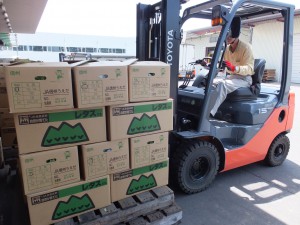Kazuhiro Shimamura, Chikuma Kume
Worries are growing among farmers that if the National Federation of Agricultural Cooperative Associations (JA Zen-Noh) is transformed into a joint-stock corporation as a government panel has proposed, it will weaken the JA group’s pricing power, thus leading to a reduction in their incomes.
The Regulatory Reform Council has proposed that JA Zen-Noh, which is engaged in collection and sales of farm products, should be converted to a joint-stock corporation to make it easier to procure funds, but farmers are concerned that if it becomes a corporation, it would come under the Antimonopoly Act, which means it would be banned from jointly purchasing and selling products.
If that happens, retailers will have more power to set prices based on market demand, says Mitsuo Kawakami, 61, who grows apples and grapes in a one-hectare land in Nagano Prefecture.
Kawakami says he has been entrusting all of his products to JA Zen-Noh in Nagano for joint sales, because this system allows him to concentrate on producing fruits and ensuring stable supplies.
If JA Zen-Noh is converted to a joint-stock corporation, it will not be treated as a cooperative organization which is exempt from the application of the antitrust law, and the JA group’s system of jointly selling farm products is likely to be regarded as the violation of the law.
In Nagano, 20 agricultural cooperatives entrust sales of farm products to JA Zen-Noh under a unified brand. JA Zen-Noh is responsible for marketing and selling products to wholesalers and retailers, as well as establishing a relay shipment system within the prefecture to secure stable supply.
If the system of joint sales through JA Zen-Noh is to be banned, primary farm co-ops will have to market their products individually, which would weaken their power in negotiating prices and other sales conditions with giant retail stores, and also hinder the relay shipment system, thus destabilizing supply.
It would also threaten the unity of the JA group, because farm co-ops and JA Zen-Noh, which have maintained close relations based on an unconditional contract for consigning products, would have to conduct transactions as sellers and buyers of agricultural products.
Yasutomo Shiokawa, managing director of JA Shinshu Ueda in Nagano, warns that the collapse of the joint sales system would have adverse effects not only on farmers but also on consumers, as the system is aimed at stabilizing prices and supply of farm products.

Boxes of lettuces grown in Nagano Prefecture, marked with JA Zen-Noh Nagano’s unified brand Mitsuyama, are prepared for shipment at JA Shinshu Ueda’s distribution center in Ueda, Nagano Prefecture.
Making JA Zen-Noh a joint-stock corporation would mean it will also be banned from joint purchase of farm machinery and fertilizers, which will weaken the JA group’s bargaining power and push up the prices of farming materials.
Since a joint-stock corporation places top priority on making profits, JA Zen-Noh may change prices of farming materials according to the amount of transactions when supplying them to farm co-ops.
Eiichi Hosaka who heads JA Shinshu Ueda points out that although Prime Minister Shinzo Abe has pledged to double farmers’ incomes and the Regulatory Reform Council is calling for an increase in farmers’ profits, making JA Zen-Noh a corporation could lead to “halving” farmers’ incomes by weakening sales and purchasing power of the JA group. (June 4, 2014)
(June 4, 2014)

